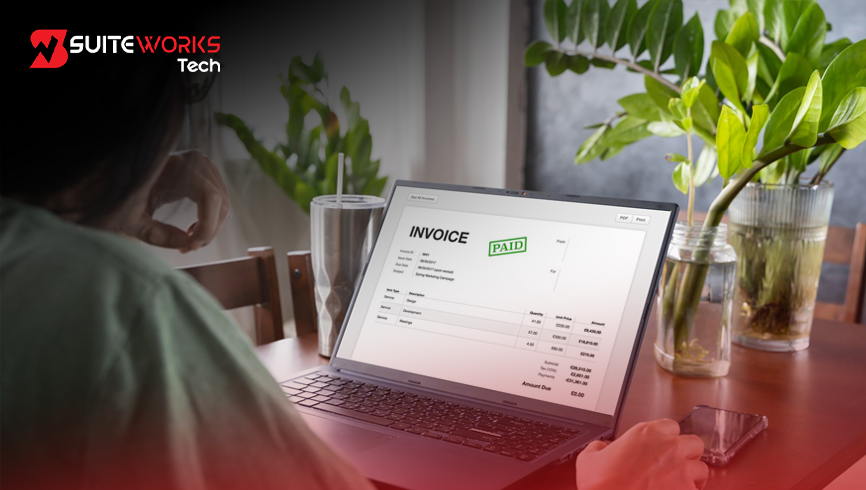Subscription Billing Solutions for NetSuite: Features & Benefits

Subscription Billing Solutions for NetSuite: Features & Benefits By Manasa, Sr. NetSuite Solution Architect at SuiteWorks TechAugust 29, 2025 In today’s subscription-driven economy, businesses across industries—SaaS, digital services, professional services, and more—face the challenge of managing recurring revenue efficiently. From billing accuracy to customer satisfaction, every aspect of subscription management impacts growth. Modern subscription billing solutions simplify these complexities, enabling businesses to automate billing, reduce errors, and scale with confidence. SuiteWorks Tech, a trusted NetSuite Solution Provider, has extensive experience in implementing NetSuite-based subscription billing projects across multiple industries. Drawing on this expertise, we explore the top features and benefits of modern subscription billing solutions for NetSuite users. 1. Automated Subscription Billing Solutions for NetSuite Automation is the cornerstone of effective subscription management. Manual invoice generation often leads to errors such as duplicate charges, missed invoices, or incorrect billing amounts. Modern subscription billing solutions automate invoice creation and subscription management, ensuring accuracy and reliability. SuiteWorks Tech’s NetSuite Subscription Billing Solution is built natively on the NetSuite platform, which allows businesses to manage the entire subscription lifecycle—from initial signup to renewal or cancellation—directly within their ERP system. This seamless integration eliminates the need for third-party tools and reduces manual intervention, providing a more efficient and error-free billing process. 2. Flexible Recurring Billing Capabilities Recurring billing is at the heart of subscription-based businesses. Companies often require varied billing cycles, including monthly, quarterly, bi-monthly, or annual subscriptions. A modern subscription billing solution must accommodate these different cycles without creating operational complexity. The NetSuite recurring billing engine within SuiteWorks Tech’s solution automates invoice generation for any frequency. By doing so, businesses maintain consistent cash flow, reduce administrative effort, and avoid potential billing discrepancies. Whether managing SaaS subscriptions or long-term contracts, these tools ensure reliability and accuracy. 3. One-Time and Add-On Billing While recurring billing forms the core of subscription management, businesses frequently need to handle one-time charges for additional services or products. Modern subscription billing solutions allow seamless integration of one-time billing alongside recurring charges. SuiteWorks Tech’s NetSuite platform handles both recurring and one-time billing effortlessly. This ensures full control over invoicing scenarios, keeping financial data centralized and consistent for reporting and compliance purposes. 4. Usage-Based Billing for Precise Charges For many SaaS, IoT, and professional service companies, usage-based billing is essential. Modern subscription billing solutions allow businesses to generate invoices based on actual usage—whether hourly, daily, or monthly—ensuring that customers pay precisely for what they consume. SuiteWorks Tech’s NetSuite subscription solution supports dynamic usage-based billing, making it ideal for short-term projects, long-term subscriptions, or any scenario where billing needs to reflect real consumption. Accurate billing builds customer trust and reduces disputes, fostering long-term loyalty. 5. Flexible Billing Schedules and Options Businesses today require flexibility in billing schedules, including the ability to bill customers in advance or in arrears. Modern subscription billing solutions provide configurable schedules, ensuring invoices are generated at the right intervals and in accordance with the company’s revenue model. Automating these schedules reduces missed invoices, late payments, and cash flow disruptions. SuiteWorks Tech’s NetSuite solution allows businesses to scale operations efficiently without adding unnecessary manual work. 6. Accurate Pro-Rata Calculations Mid-cycle subscription changes, such as upgrades, downgrades, or partial usage, are common in dynamic businesses. Accurate pro-rata calculations are critical to ensuring customers are charged fairly. SuiteWorks Tech’s NetSuite Subscription Billing software includes built-in pro-rata logic, allowing businesses to manage mid-cycle changes without overcharging. Transparent billing fosters trust, increases customer satisfaction, and reduces administrative follow-ups. 7. Seamless Upgrades, Downgrades, and Renewals Customer needs evolve over time, and billing systems must adapt without disrupting operations. Modern subscription billing solutions support seamless subscription upgrades, downgrades, and automated renewals. Dynamic pricing adjustments and automated renewal processes prevent revenue leakage while maintaining customer satisfaction. SuiteWorks Tech’s solution ensures mid-cycle changes are applied without affecting existing billing schedules, providing both flexibility and reliability. 8. Efficient Subscription Termination Handling Cancellations are inevitable, but managing them efficiently is crucial to protect revenue and maintain transparency. Modern subscription billing solutions provide end-to-end handling of subscription terminations, including accurate final billing. SuiteWorks Tech’s NetSuite-native solution allows businesses to manage cancellations smoothly, reducing disputes and ensuring financial accuracy. Customers experience professional service even during terminations, strengthening overall satisfaction and retention. 9. Built-In Reporting and Dashboards Beyond invoicing, modern subscription billing solutions offer comprehensive reporting and dashboard capabilities. Real-time visibility into revenue trends, subscription performance, and customer behavior allows businesses to make informed, data-driven decisions. SuiteWorks Tech’s solution provides custom dashboards and reports within NetSuite ERP, offering insights into subscription metrics and financial performance. This visibility enables smarter planning, resource allocation, and long-term strategy development. 10. Seamless Integration with NetSuite ERP Integration is key to operational efficiency. Native NetSuite subscription billing solutions ensure smooth connectivity across accounting, CRM, inventory, and order management modules. SuiteWorks Tech’s NetSuite-native architecture eliminates third-party connectors, reducing implementation complexity and increasing reliability. A unified system ensures subscription data flows seamlessly, improving accuracy and operational efficiency. Industries Benefiting from Subscription Billing Solutions Modern subscription billing solutions support diverse industries that rely on recurring revenue models, including: 🔹SaaS & Software Development – recurring licenses and add-ons 🔹Healthcare & Medical Services – digital and recurring patient services 🔹Professional Services Firms – retainers and ongoing contracts 🔹E-learning & Online Education – subscription-based courses 🔹Media & Digital Content Providers – recurring content access 🔹IoT & Smart Device Providers – usage-based metered billing 🔹Financial Services & FinTech – recurring service fees These industries rely on accurate billing, automation, and visibility to maintain strong customer relationships and operational efficiency. Support and Expertise from SuiteWorks Tech While technology drives automation, expert guidance ensures smooth implementation and ongoing success. As a leading NetSuite Solution Provider, SuiteWorks Tech offers: 🔹Rapid setup and onboarding for NetSuite subscription billing 🔹Dedicated technical support for recurring billing issues 🔹Flexible customization to accommodate business-specific logic 🔹Training and documentation for internal teams 🔹Ongoing optimization to scale with your business Combining technology and expert support ensures businesses fully leverage modern subscription billing
Top Features of Modern Subscription Billing Solutions

Top Features of Modern Subscription Billing Solutions By Manasa, Sr. NetSuite Solution Architect at SuiteWorks TechAugust 29, 2025 Subscription-based business models are rapidly becoming the backbone of many industries, from SaaS platforms to digital services and professional service firms. Managing recurring revenue efficiently requires modern subscription billing solutions that ensure accuracy, scalability, and flexibility. Without the right system, businesses often struggle with billing errors, delayed payments, and operational inefficiencies. In this article, we explore the top features of modern subscription billing solutions, highlighting how companies can streamline their processes while enhancing customer satisfaction. Insights are drawn from SuiteWorks Tech, a trusted NetSuite Solution Provider, and their extensive experience implementing subscription billing projects across industries. Automated Subscription Billing for Accuracy and Efficiency Automation is the foundation of any effective subscription billing solution. Manually generating invoices can lead to costly mistakes such as duplicate charges, missed invoices, or incorrect billing amounts. A robust solution automates subscription invoice creation and management, reducing errors and freeing teams to focus on more strategic tasks. SuiteWorks Tech’s NetSuite Subscription Billing Solution is built natively on the NetSuite platform, enabling seamless automation of recurring billing processes. By leveraging NetSuite’s architecture, businesses can handle the full subscription lifecycle—from initial signup to renewal or cancellation—without leaving their ERP ecosystem. Flexible Recurring Billing Options Modern businesses often require diverse billing cycles, such as monthly, quarterly, bi-monthly, or annual subscriptions. A good subscription billing solution should accommodate all these variations with minimal manual intervention. NetSuite’s recurring billing engine automates invoice generation for any frequency, maintaining consistent cash flow and reducing administrative workload. This flexibility is particularly beneficial for businesses that manage multiple subscription tiers or customer-specific billing arrangements. One-Time Charges and Add-On Billing While recurring billing forms the core of subscription businesses, one-time charges for additional services or products are equally important. Modern subscription billing solutions allow businesses to handle these charges seamlessly without requiring separate systems. SuiteWorks Tech’s NetSuite solution supports both recurring and one-time billing, offering complete control over invoicing scenarios while keeping all data centralized in the ERP. This ensures that financial reporting remains accurate and accessible, simplifying audit and compliance processes. Usage-Based Billing for Dynamic Pricing Many businesses, especially SaaS and IoT providers, rely on usage-based billing models. A flexible subscription billing solution can generate invoices based on actual usage, whether hourly, daily, or monthly. SuiteWorks Tech’s NetSuite Subscription Billing software enables businesses to align charges with real consumption, ensuring accurate billing for both short-term projects and ongoing subscriptions. This transparency builds customer trust and supports fair pricing practices. Flexible Billing Schedules A key feature of modern subscription billing solutions is the ability to configure billing schedules based on business requirements. Companies can bill customers in advance or in arrears, depending on their model, and set up monthly, quarterly, or annual intervals. By automating these schedules, businesses avoid missed invoices, late payments, and cash flow disruptions. Flexible billing also allows organizations to scale their operations without introducing additional complexity. Accurate Pro-Rata Calculations Subscription changes, such as mid-cycle upgrades or partial-period usage, are common in dynamic business environments. Accurate pro-rata calculations are crucial to ensure customers are billed only for the services they consume. SuiteWorks Tech’s NetSuite Subscription Billing solution includes built-in pro-rata logic, preventing overcharges and enhancing customer satisfaction. Transparent billing encourages long-term loyalty and reduces disputes. Seamless Subscription Upgrades, Downgrades, and Renewals Customer needs evolve, and subscription billing systems must adapt without disrupting existing schedules. NetSuite subscription billing supports seamless upgrades, downgrades, and automated renewals. Dynamic pricing adjustments and automated renewals prevent revenue leakage, ensuring ongoing customer satisfaction. This flexibility also simplifies internal operations, reducing the administrative effort required for plan changes. Efficient Subscription Termination Handling Managing cancellations efficiently is essential for customer trust and revenue integrity. Modern subscription billing solutions handle terminations end-to-end, ensuring accurate final invoices and complete transparency. SuiteWorks Tech’s solution allows businesses to manage subscription closures seamlessly, reducing disputes and protecting financial accuracy while maintaining a professional customer experience. Built-In Reporting and Dashboards Billing is not just about invoicing—it’s about insights. Effective subscription billing solutions offer comprehensive reporting tools and dashboards, providing visibility into revenue trends, subscription performance, and profitability. SuiteWorks Tech’s NetSuite solution delivers real-time analytics and custom dashboards. Integrated with NetSuite ERP modules, these insights empower business leaders to make data-driven decisions and optimize subscription strategies. Seamless Integration with NetSuite ERP A modern subscription billing solution should integrate smoothly with existing ERP systems. Native integration ensures that subscription data flows seamlessly across accounting, CRM, inventory, and order management modules. SuiteWorks Tech’s NetSuite-native architecture eliminates the need for third-party connectors, reducing implementation complexity and enhancing operational efficiency. This creates a unified platform where subscription management and financial processes work in harmony. Industries Benefiting from Subscription Billing Solutions Modern subscription billing solutions are versatile, supporting a wide range of industries: 🔹SaaS & Software Development – recurring licenses and add-ons 🔹Healthcare & Medical Services – recurring patient subscriptions or digital services 🔹Professional Services Firms – retainers and recurring contracts 🔹E-learning & Online Education – subscription-based courses and materials 🔹Media & Digital Content Providers – recurring content access fees 🔹IoT & Smart Device Providers – usage-based metered billing 🔹Financial Services & FinTech – recurring service fees and digital subscriptions These industries rely on accurate billing, automation, and visibility to maintain strong customer relationships and operational efficiency. Support and Expertise from SuiteWorks Tech While technology is crucial, expert guidance ensures smooth implementation and ongoing success. As a trusted NetSuite Solution Provider, SuiteWorks Tech offers: 🔹Quick onboarding and setup for NetSuite subscription billing software 🔹Dedicated technical support from specialists in NetSuite recurring billing 🔹Customization for unique subscription models and pricing structures 🔹Training and documentation for internal teams 🔹Ongoing optimization for scalable operations This combination of technology and support helps businesses maximize the value of modern subscription billing solutions. Why Choose a NetSuite-Based Subscription Billing Solution A native NetSuite subscription billing solution offers end-to-end automation and flexibility without relying on external tools. Benefits
Top Features to Look for in a Subscription Billing System

Top Features to Look for in a Subscription Billing System By Manasa, Sr. NetSuite Solution Architect at SuiteWorks TechAugust 29, 2025 Subscription-based business models are rapidly transforming the way companies deliver products and services. From SaaS platforms to digital content providers, recurring revenue streams require a subscription billing system that is not only accurate but also flexible and scalable. As companies grow, manual billing processes quickly become a bottleneck, leading to errors, delayed payments, and frustrated customers. Choosing the right system can make a huge difference in operational efficiency and revenue growth. In this article, we explore the top features to look for in a subscription billing system, drawing insights from SuiteWorks Tech, a trusted NetSuite Solution Provider, and their experience delivering end-to-end NetSuite subscription billing solutions. Automated Subscription Billing to Reduce Errors One of the most critical features of any subscription billing system is automation. Manual billing introduces the risk of errors—miscalculations, missed invoices, or double billing. A robust system automates the generation and management of subscription invoices, ensuring customers are billed correctly based on their active plans. SuiteWorks Tech’s NetSuite Subscription Billing software, built directly on the NetSuite platform, eliminates the need for manual intervention. This automation not only improves accuracy but also frees up your finance team to focus on higher-value tasks such as customer service and revenue growth. Support for One-Time Charges and Add-Ons While recurring billing is the foundation of subscription businesses, one-time charges for add-ons or extra services are common. The best subscription billing system allows businesses to handle these seamlessly without leaving the platform. With flexible one-time billing, you can charge customers for upgrades, consulting fees, or special services while keeping all data within your NetSuite ERP ecosystem. This ensures full control over billing scenarios and simplifies financial tracking. Flexible Recurring Billing Cycles Every business has unique subscription cycles—monthly, quarterly, bi-monthly, or annual. A robust subscription billing system should support any frequency without requiring manual adjustments. NetSuite’s recurring billing engine automatically generates invoices according to your specified schedule. This guarantees consistent cash flow, reduces administrative work, and helps businesses maintain predictable revenue streams. Usage-Based Billing for Fair and Accurate Invoicing Modern businesses often rely on usage-based or metered billing. Whether you charge by hours, consumption, or transactions, your subscription billing system must handle these dynamically. With SuiteWorks Tech’s NetSuite Subscription Billing software, businesses can generate usage-based invoices daily, weekly, or monthly. This ensures customers are billed accurately for the services they use, fostering trust and transparency. Flexible Billing Schedules A truly adaptable subscription billing system allows you to configure billing schedules according to your business model. Whether you prefer billing in advance or in arrears, monthly, quarterly, or annually, flexibility is key. By automating these schedules, businesses avoid missed invoices, reduce disputes, and maintain strong cash flow management. Flexible scheduling also allows companies to scale without additional complexity. Accurate Pro-Rata Calculations Mid-cycle changes are inevitable in subscription models. Customers may upgrade or downgrade their plans, or adjustments may be required for partial-period usage. The best subscription billing systems, like SuiteWorks Tech’s NetSuite solution, include accurate pro-rata calculation features. Customers are billed only for the services used, preventing overcharges and enhancing satisfaction. This ensures billing transparency and strengthens customer loyalty. Seamless Upgrades, Downgrades, and Renewals Customer needs evolve, and your billing system must adapt without disrupting existing invoices. NetSuite subscription billing supports seamless upgrades, downgrades, and automated renewals. Dynamic pricing adjustments and automated subscription renewals reduce revenue leakage and ensure customers experience smooth transitions. Businesses benefit from increased retention and a streamlined operational process. Efficient Subscription Termination Handling Handling cancellations correctly is vital. A comprehensive subscription billing system manages terminations efficiently, ensuring accurate final billing and complete transparency. With end-to-end termination management, companies avoid disputes, maintain customer trust, and handle billing closures professionally. This reduces administrative burden while protecting revenue integrity. Built-In Reporting and Dashboards Billing is not just about invoicing—it’s about insight. Advanced subscription billing systems offer reporting tools and dashboards that provide visibility into revenue trends, subscription performance, and profitability. SuiteWorks Tech’s NetSuite solution delivers real-time analytics, enabling finance teams and business leaders to make informed, data-driven decisions. Integration with the NetSuite ERP ensures that all data flows seamlessly across accounting, CRM, and inventory modules. Customization and Integration Capabilities No two businesses are alike. A subscription billing system must allow for flexible customization to meet specific business needs. SuiteWorks Tech’s NetSuite Subscription Billing software supports custom billing logic, pricing models, and payment terms. Native integration with NetSuite ERP eliminates the need for third-party connectors, reducing implementation complexity. Businesses benefit from a unified system where subscription data flows smoothly across departments, enhancing accuracy and operational efficiency. Industries That Benefit from a Subscription Billing System A well-designed subscription billing system is versatile enough to serve multiple industries: 🔹SaaS & Software Development – recurring licenses, add-ons, and usage-based billing 🔹Healthcare & Medical Services – recurring patient or platform subscriptions 🔹Professional Services Firms – billing for retainers and recurring contracts 🔹E-learning & Online Education – subscription courses and add-on modules 🔹Media & Digital Content Providers – recurring subscriptions for content access 🔹IoT & Smart Device Providers – metered billing and usage-based plans 🔹Financial Services & FinTech – recurring service fees and digital subscriptions These industries rely heavily on accuracy, flexibility, and reporting capabilities to maintain trust and operational efficiency. Support and Expertise from SuiteWorks Tech While technology is essential, expert support ensures that your subscription billing operations run smoothly. As a trusted NetSuite Solution Provider, SuiteWorks Tech offers: 🔹Quick setup and onboarding of NetSuite subscription billing software 🔹Dedicated technical support from specialists in NetSuite recurring billing 🔹Customization for unique subscription logic and pricing models 🔹Training and documentation to empower teams 🔹Ongoing optimization to scale with business growth This combination of technology and expert guidance ensures businesses maximize the value of their subscription billing systems. Why a NetSuite-Based Subscription Billing System is Ideal By choosing a native NetSuite solution, businesses avoid the complexities
Top 10 Benefits of Using NetSuite Billing for Your Business

Top 10 Benefits of Using NetSuite Billing for Your Business By Manasa, Sr. NetSuite Solution Architect at SuiteWorks TechAugust 29, 2025 Managing billing across subscriptions, contracts, and one-time services is never simple. Errors creep in, cash flow gets delayed, and customer trust is put at risk. Businesses running on recurring revenue models like SaaS, healthcare services, or digital media need billing systems that don’t just keep up—but actually simplify the entire process. That’s where NetSuite billing becomes a game-changer. In this article, we’ll explore the top 10 benefits of using NetSuite billing for your business, drawing from the expertise of SuiteWorks Tech, a trusted NetSuite Solution Provider delivering automation and flexibility right inside NetSuite. 1. Automated Subscription Billing with Precision At the heart of NetSuite billing lies automation. Instead of manually generating recurring invoices, the system automates the entire process. Every active subscription is billed with accuracy, ensuring that customers are invoiced correctly and on time. For businesses scaling quickly, this automation eliminates the risk of missed invoices or double-charging, freeing teams to focus on customer relationships rather than repetitive tasks. 2. Simplified One-Time and Add-On Charges Subscription businesses often need to bill beyond recurring plans—like charging for an implementation fee, extra storage, or consulting services. NetSuite billing makes it easy to handle both recurring and one-time charges without leaving the platform. This flexibility ensures your billing system adapts to real-world scenarios, whether it’s a long-term subscription or a one-off service. 3. Consistency Through Recurring Billing Whether your customers are billed monthly, quarterly, or annually, NetSuite billing adapts seamlessly. The recurring billing engine automatically generates invoices at the right intervals, ensuring cash flow remains consistent and predictable. For finance teams, this means fewer surprises and a smoother revenue management cycle. 4. Usage-Based Billing for Modern Business Models Many industries now rely on pay-as-you-go services. NetSuite billing supports usage-based invoicing, whether daily, weekly, or monthly. SaaS companies, managed services providers, and IoT businesses can charge based on actual usage—ensuring fairness, transparency, and alignment with customer expectations. This ensures that your billing system is ready for both traditional and modern revenue models. 5. Flexible Billing Schedules to Match Any Business Every business is different. Some customers prefer paying in advance, while others want to be billed in arrears. NetSuite billing offers the flexibility to support both models. This adaptability reduces friction in negotiations and lets businesses cater to customer preferences without adding complexity to their billing process. 6. Accurate Pro-Rata Calculations One of the most challenging aspects of subscription management is handling mid-cycle changes. A customer may upgrade or downgrade their plan halfway through the month. NetSuite billing handles these scenarios with built-in pro-rata logic—charging only for the exact services used. This prevents overcharges, avoids disputes, and builds trust with your customers. 7. Smooth Upgrades, Downgrades, and Renewals Customer needs evolve. NetSuite billing ensures that upgrades, downgrades, and renewals are managed without disrupting billing schedules. With automation handling pricing adjustments in real time, businesses can confidently offer flexibility while ensuring accuracy in subscription payments. This is key to retaining customers and reducing churn. 8. Error-Free Termination Handling Cancellations are never pleasant, but they must be managed with precision. NetSuite billing makes subscription terminations straightforward, generating accurate final invoices and closing the account with transparency. This reduces disputes and ensures customers leave with a professional, positive experience. 9. Real-Time Reporting and Insights Billing is more than just sending invoices—it’s about understanding the financial health of your business. With built-in dashboards and reporting tools, NetSuite billing provides visibility into revenue trends, subscription performance, and profitability. Finance leaders can make smarter, data-driven decisions with access to live insights—all within the NetSuite platform. 10. Stronger Cash Flow and Reduced Manual Errors When billing runs smoothly, cash flow improves. With NetSuite billing automation, invoices are generated and sent on time, payments are consistent, and financial teams spend less time correcting mistakes. The result? A healthier bottom line, fewer disputes, and greater efficiency across the board. Why NetSuite Billing Stands Out Unlike standalone billing tools, SuiteWorks Tech’s NetSuite Subscription Billing Solution is built natively inside NetSuite ERP. This means: No need for third-party connectors Subscription data flows seamlessly across accounting, CRM, and order management Businesses operate from a single source of truth It’s not just about billing—it’s about creating an integrated ecosystem where data, processes, and revenue management come together. Industries Benefiting from NetSuite Billing The advantages of NetSuite billing stretch across industries: 🔹SaaS & Software Development – recurring licenses, add-ons, and usage-based charges 🔹Healthcare & Medical Services – subscriptions for digital health platforms 🔹Professional Services Firms – billing for retainers and recurring contracts 🔹Media & Digital Content Providers – managing monthly subscriptions and bundles 🔹E-learning & Education – recurring course subscriptions and add-on fees This flexibility makes NetSuite billing an ideal solution for businesses with complex, recurring revenue models. Support that Scales with Your Business At SuiteWorks Tech, we understand that billing is central to your growth. That’s why our support doesn’t stop at implementation. Businesses benefit from: Quick setup and onboarding Expert guidance from a dedicated NetSuite team Customization for unique billing models Ongoing optimization to keep systems aligned with growth This ensures that your NetSuite billing solution continues to deliver long-term value. The Competitive Advantage of NetSuite Billing Every business wants accurate billing, smooth cash flow, and happy customers. NetSuite billing provides all three by automating complexity, supporting flexible models, and offering real-time insights. For growing companies, it’s not just a software upgrade—it’s a foundation for scale, customer trust, and financial resilience. Book a Free Consultation with Our NetSuite Experts Our NetSuite Solutions Written By Manasa Manasa is a Senior NetSuite Solution Architect at SuiteWorks Tech, with over 10 years of experience designing and implementing NetSuite-based solutions across industries. She has led successful implementations across retail, distribution, manufacturing, and service-based industries. Her expertise spans automation, customization, and AI integration for NetSuite systems. She specializes in creating tailored SuiteApps
NetSuite Billing for SaaS and Subscription Businesses: A Complete Overview

NetSuite Billing for SaaS and Subscription Businesses: A Complete Overview By Manasa, Sr. NetSuite Solution Architect at SuiteWorks TechAugust 29, 2025 SaaS and subscription-based businesses thrive on predictable revenue, but billing can quickly become complex. From handling recurring invoices to managing upgrades, downgrades, or cancellations, manual processes often lead to errors, revenue leakage, and unhappy customers. That’s where NetSuite billing comes into play. In this article, we’ll walk through how SuiteWorks Tech’s NetSuite Subscription Billing solution helps SaaS and subscription businesses streamline operations, boost accuracy, and deliver a seamless customer experience. The Growing Importance of NetSuite Billing in SaaS Models Running a SaaS or subscription business requires more than just offering great software—it demands billing systems that scale with customer needs. Imagine a growing SaaS provider juggling: 🔹Monthly subscriptions for small businesses 🔹Quarterly contracts for mid-sized companies 🔹Enterprise-level annual agreements 🔹Add-ons, one-time charges, or usage-based pricing Without automation, billing all these variations becomes chaotic. Delays, errors, and disputes can damage trust and slow down growth. NetSuite billing eliminates these hurdles by automating every stage of the subscription lifecycle—right from signup to renewals or cancellations—within the NetSuite ecosystem. How SuiteWorks Tech Brings NetSuite Billing to Life At SuiteWorks Tech, we have built a native SuiteApp—NetSuite Subscription Billing software—that integrates seamlessly with NetSuite ERP. Designed specifically for SaaS and recurring revenue models, it offers end-to-end billing automation tailored to modern businesses. Instead of managing billing through multiple tools, our solution leverages NetSuite’s robust architecture, ensuring invoices, usage data, and subscription changes flow directly into your existing system. This means greater accuracy, fewer errors, and a billing process that scales as quickly as your SaaS business does. 👉 Learn more about our NetSuite Subscription Billing Solution. Key Features of NetSuite Billing for SaaS and Subscription Businesses Automated Subscription Billing Recurring invoices are generated automatically based on active subscription plans. This ensures customers are billed correctly, on time, and without manual intervention. One-Time and Usage-Based Billing Beyond recurring charges, SaaS providers often need to bill for add-ons, extra storage, or API calls. Our solution supports both one-time billing and usage-based models, making it ideal for flexible SaaS offerings. Pro-Rata Calculations and Mid-Cycle Adjustments SaaS customers frequently upgrade or downgrade their plans mid-cycle. With accurate pro-rata calculations, they are only charged for what they use, avoiding disputes and boosting satisfaction. Seamless Renewals and Cancellations Our software minimizes revenue leakage by automating renewals, while also handling cancellations with accurate final billing—ensuring transparency and trust. Flexible Billing Schedules Whether your SaaS customers prefer monthly, quarterly, or annual billing, the system adapts. Even advanced models like in-arrears or in-advance billing are supported effortlessly. Benefits of NetSuite Billing for SaaS Businesses Reduced Errors and Improved Accuracy Manual billing introduces risk. Automating with NetSuite billing ensures invoices are precise, freeing finance teams from repetitive tasks. Enhanced Customer Experience Fair charges through pro-rata billing and easy mid-cycle changes increase customer trust and retention. Better Cash Flow Management With invoices sent consistently at the right intervals, SaaS companies avoid late payments and cash flow gaps. Data-Driven Decision Making Built-in dashboards provide visibility into subscription revenue trends, enabling smarter business strategies. How NetSuite Billing Software Works for SaaS SuiteWorks Tech’s solution is built natively on NetSuite, eliminating the need for third-party connectors. SaaS companies can: 🔹Create recurring invoices directly within NetSuite 🔹Manage upgrades, downgrades, and cancellations without disrupting billing 🔹Track subscription performance through real-time dashboards 🔹Customize billing logic to match business-specific models This unified workflow ensures smooth subscription management while allowing your SaaS business to scale without worrying about billing bottlenecks. Seamless Integration with NetSuite ERP A major advantage of SuiteWorks Tech’s NetSuite billing software is native integration. Accounting, CRM, inventory, and order management modules all connect seamlessly, giving you a single source of truth for subscription data. This ensures accuracy across departments and eliminates the inefficiencies of managing multiple disconnected tools. Industries Benefiting from NetSuite Billing While SaaS is one of the most obvious beneficiaries, SuiteWorks Tech’s subscription billing solution supports a variety of industries, including: 🔹Software Development & SaaS 🔹Healthcare and Medical Services 🔹Digital Media & Content Providers 🔹Professional Services Firms 🔹E-learning and Education Platforms 🔹IoT & Smart Device Providers Each of these industries relies on recurring revenue, making NetSuite billing a game-changer for managing subscriptions. Pricing and Support SuiteWorks Tech ensures affordability without compromising functionality. With transparent pricing and no hidden fees, businesses can unlock powerful NetSuite billing automation tailored to their size and needs. Our support extends beyond deployment, including: 🔹Quick setup and onboarding 🔹Dedicated technical support 🔹Flexible customization for unique billing needs 🔹Ongoing optimization and training With this, SaaS providers can focus on growth while relying on a trusted NetSuite Solution Provider. Why NetSuite Billing Is the Future for SaaS In today’s subscription economy, customers expect flexibility, accuracy, and transparency. NetSuite billing meets those demands by automating complex processes, reducing errors, and enabling SaaS businesses to scale with confidence. For growing SaaS companies, this isn’t just software—it’s a competitive advantage. Book a Free Consultation with Our NetSuite Experts Our NetSuite Solutions Written By Manasa Manasa is a Senior NetSuite Solution Architect at SuiteWorks Tech, with over 10 years of experience designing and implementing NetSuite-based solutions across industries. She has led successful implementations across retail, distribution, manufacturing, and service-based industries. Her expertise spans automation, customization, and AI integration for NetSuite systems. She specializes in creating tailored SuiteApps that streamline operations and increase ROI.
How NetSuite Subscription Billing Simplifies Usage-Based Invoicing

How NetSuite Subscription Billing Simplifies Usage-Based Invoicing By Manasa, Sr. NetSuite Solution Architect at SuiteWorks TechAugust 15, 2025 Billing for usage-based services can often be complex. Whether your business charges customers by the hour, by consumption, or project milestones, accurate invoicing is crucial to maintaining customer trust and ensuring consistent cash flow. With NetSuite subscription billing, businesses can automate usage-based invoicing while improving accuracy, reducing errors, and providing a seamless customer experience. As a Senior NetSuite Solution Architect at SuiteWorks Tech with over 10 years of experience implementing NetSuite solutions across diverse industries, I have witnessed how businesses can transform their billing operations using a comprehensive, integrated subscription billing solution. Streamlining Usage-Based Invoicing with NetSuite Subscription Billing Hourly-based or usage-driven services often face the challenge of manual tracking, delayed invoicing, and potential billing errors. NetSuite subscription billing eliminates these challenges by automating invoice creation based on actual usage data. With SuiteWorks Tech’s NetSuite Subscription Billing Solution, businesses can: 🔹Generate invoices daily, weekly, or monthly based on usage 🔹Handle one-time charges for additional services 🔹Apply accurate proration for mid-cycle plan adjustments This ensures that customers are billed fairly, improving trust and satisfaction while reducing administrative overhead. Key Benefits of NetSuite Subscription Billing for Usage-Based Services Automated Recurring Billing Manual invoice generation is time-consuming and prone to errors. With NetSuite subscription billing, recurring invoices are created automatically at specified intervals—whether monthly, quarterly, or annually. This ensures that your business maintains consistent cash flow while minimizing errors associated with manual invoicing. Flexible Billing Schedules Businesses offering usage-based services require flexibility in billing schedules. SuiteWorks Tech’s solution allows billing in advance or in arrears depending on your business model. This flexibility ensures that all invoices are generated at the correct intervals, reflecting accurate service usage. Pro-Rata Calculations for Mid-Cycle Adjustments Service plans may change mid-cycle, requiring accurate billing for partial usage. Built-in pro-rata calculations ensure customers are charged only for the services they use. This capability prevents overcharging and builds customer trust, which is essential for long-term retention. Usage-Based Billing Made Simple A key strength of NetSuite subscription billing is its ability to handle usage-based invoicing seamlessly. Whether tracking hours, consumed units, or any measurable activity, the system: 🔹Captures real-time usage data 🔹Automates invoice calculations 🔹Integrates directly with NetSuite for financial reporting This allows businesses to focus on delivering services while ensuring accurate billing and reporting without manual intervention. Seamless Integration with NetSuite ERP SuiteWorks Tech’s NetSuite subscription billing solution is built natively on the NetSuite platform, ensuring smooth integration with existing ERP modules such as accounting, CRM, inventory, and order management. Benefits Include: 🔹Unified data flow across departments 🔹Enhanced reporting for revenue tracking 🔹Real-time dashboards for monitoring subscription performance The result is a centralized, automated system where billing and subscription management coexist seamlessly. Support for Plan Upgrades, Downgrades, and Terminations Usage-based services often require plan adjustments. SuiteWorks Tech’s solution handles upgrades, downgrades, renewals, and cancellations without disrupting billing schedules. Businesses can: 🔹Ensure accurate invoice adjustments for mid-cycle changes 🔹Minimize revenue leakage during renewals 🔹Provide frictionless transitions for customers This flexibility strengthens customer relationships and ensures reliable billing operations. Make Informed Business Decisions Accurate and timely data is critical for managing subscription-based and usage-driven services. NetSuite subscription billing provides: 🔹Customizable dashboards for real-time insights 🔹Detailed reports on subscription revenue trends 🔹Data-driven insights to optimize pricing and resource allocation By leveraging these analytics, businesses can make strategic decisions that enhance profitability and growth. Industries That Benefit from Usage-Based Billing SuiteWorks Tech’s NetSuite subscription billing solution supports a range of industries that rely on recurring revenue and usage-based models, including: 🔹SaaS & software development 🔹IT & managed services 🔹E-learning & online education 🔹Healthcare & medical services 🔹Professional services firms For businesses offering hourly or consumption-based services, this solution delivers scalable, accurate billing and automated subscription management tailored to industry needs. Book a Free Consultation with Our NetSuite Experts Our NetSuite Solutions Written By Manasa Manasa is a Senior NetSuite Solution Architect at SuiteWorks Tech, with over 10 years of experience designing and implementing NetSuite-based solutions across industries. She has led successful implementations across retail, distribution, manufacturing, and service-based industries. Her expertise spans automation, customization, and AI integration for NetSuite systems. She specializes in creating tailored SuiteApps that streamline operations and increase ROI.
Top Benefits of NetSuite Subscription Billing for Hourly-Based Services

Top Benefits of NetSuite Subscription Billing for Hourly-Based Services By Manasa, Sr. NetSuite Solution Architect at SuiteWorks TechAugust 14, 2025 Managing hourly-based services can be complex—tracking usage, generating invoices, and ensuring timely payments are critical to business success. With SuiteWorks Tech’s NetSuite subscription billing solution, businesses can automate these processes, reduce errors, and improve cash flow—all while providing a seamless experience for their customers. Over my 10 years as a Senior NetSuite Solution Architect at SuiteWorks Tech, I have helped companies across industries implement subscription billing solutions that streamline recurring invoicing, support usage-based billing, and offer full lifecycle management—all within the NetSuite ecosystem. Why Hourly-Based Services Benefit from NetSuite Subscription Billing Hourly-based services, like IT consulting, digital content provision, and professional services, require accurate tracking and flexible billing schedules. Without automation, businesses face the risk of underbilling, overbilling, and delayed invoices. A NetSuite subscription billing solution addresses these challenges by enabling automated recurring billing, usage-based invoicing, and proration for mid-cycle plan changes. By integrating directly with NetSuite, businesses maintain a unified system that reduces errors, improves operational efficiency, and ensures customer trust. Automated Billing for Precise Hourly Invoicing Manual billing can be time-consuming and prone to mistakes. With automated NetSuite subscription billing, invoices are generated accurately based on actual usage or subscription plans. Key Advantages: 🔹Recurring invoices at daily, weekly, monthly, or custom intervals 🔹One-time billing for additional services or add-ons 🔹Automatic proration for partial-period usage For hourly-based services, this ensures that customers are billed exactly for the hours they consume, preventing overcharges and improving satisfaction. Flexible Billing Schedules with NetSuite Subscription Billing Businesses offering hourly services often need flexible billing cycles to match project timelines. NetSuite subscription billing allows billing in advance or in arrears, supporting any business model. With features like recurring billing, one-time charges, and mid-cycle plan adjustments, companies can easily handle upgrades, downgrades, and terminations without disrupting invoicing accuracy. This flexibility is essential for businesses that scale rapidly or manage multiple subscription tiers. Improve Cash Flow and Minimize Errors Timely and accurate billing is critical for managing cash flow. Using NetSuite subscription billing, businesses automate recurring invoices and ensure prompt payments. Additional benefits include: 🔹Reduced manual errors and administrative overhead 🔹Consistent cash flow with scheduled invoicing 🔹Transparent pro-rata calculations for mid-cycle changes These features collectively enhance financial stability while maintaining strong client relationships. Usage-Based Billing for Hourly Services One of the most powerful capabilities of NetSuite subscription billing is usage-based billing. This is particularly useful for hourly-based services, where billing must reflect actual consumption. How It Works: 🔹Track hours logged or consumed automatically 🔹Generate invoices daily, weekly, or monthly 🔹Integrate usage data directly with NetSuite ERP for seamless accounting Usage-based billing ensures fair invoicing, strengthens client trust, and reduces disputes over charges. Seamless Integration with NetSuite ERP A native integration with NetSuite allows subscription billing to function alongside accounting, CRM, and other ERP modules. Benefits of integration include: 🔹Unified data flow across departments 🔹Accurate financial reporting for revenue recognition 🔹Real-time dashboards for monitoring subscription performance By centralizing billing and subscription management, businesses reduce complexity and improve operational efficiency. Data-Driven Insights for Better Decisions Effective subscription billing isn’t just about invoicing—it’s about actionable insights. With SuiteWorks Tech’s NetSuite subscription billing solution, managers can: 🔹Track subscription revenue trends 🔹Evaluate customer retention and churn 🔹Optimize pricing and usage strategies Custom dashboards and real-time reports ensure that businesses make informed decisions backed by accurate, comprehensive data. Support for Plan Upgrades, Downgrades, and Renewals Hourly-based service providers often need to adjust subscription plans mid-cycle. NetSuite subscription billing supports seamless upgrades, downgrades, renewals, and terminations without disrupting billing cycles. These capabilities allow businesses to: 🔹Retain customers by offering flexible subscription options 🔹Automatically adjust invoices for plan changes 🔹Minimize revenue leakage during renewals The result is a more responsive, customer-focused service offering. Industries That Benefit from NetSuite Subscription Billing SuiteWorks Tech’s NetSuite subscription billing solution serves a wide range of sectors relying on recurring revenue models, including: 🔹SaaS & software development 🔹IT & managed services 🔹E-learning & online education 🔹Healthcare & medical services 🔹Professional services and consulting For hourly-based service companies, the system provides scalable, accurate billing and subscription management tailored to their operational needs. Book a Free Consultation with Our NetSuite Experts Our NetSuite Solutions Written By Manasa Manasa is a Senior NetSuite Solution Architect at SuiteWorks Tech, with over 10 years of experience designing and implementing NetSuite-based solutions across industries. She has led successful implementations across retail, distribution, manufacturing, and service-based industries. Her expertise spans automation, customization, and AI integration for NetSuite systems. She specializes in creating tailored SuiteApps that streamline operations and increase ROI.
From Booking to Return: Managing Event Rentals Using Rental Management Solution for NetSuite

From Booking to Return: Managing Event Rentals Using Rental Management Solution for NetSuite By Manasa, Sr. NetSuite Solution Architect at SuiteWorks TechAugust 14, 2025 Imagine this: you’re running an event rental business during the busiest season of the year. Bookings are pouring in, equipment is going out, and deadlines are tight. Yet, every step—from confirming a contract to ensuring timely returns—runs like clockwork. This isn’t just luck; it’s the result of using a purpose-built Rental Management Solution for NetSuite. Over my 10 years as a NetSuite Solution Architect at SuiteWorks Tech, I’ve seen how event rental companies struggle when systems are fragmented—spreadsheets for scheduling, separate billing software, and disconnected asset tracking tools. That’s why integrating your entire rental lifecycle directly inside NetSuite can be transformative. Why Event Rentals Need a Rental Management Solution for NetSuite Event rental businesses have unique challenges—tight turnaround times, varying rental periods, and high expectations for service quality. Without a centralized system, managing these moving parts can lead to errors, missed opportunities, and unhappy customers. A Rental Management Solution for NetSuite streamlines operations by managing everything in one place—contracts, billing, equipment scheduling, quality checks, and returns—while providing real-time visibility into asset availability. When built natively on NetSuite, as with the SuiteWorks Tech SuiteApp, it ensures seamless integration with your ERP, so there’s no juggling multiple systems or dealing with data sync delays. The Story of a Smooth Event Rental Lifecycle Let’s walk through a typical event rental journey—powered by a Rental Management Solution for NetSuite. Step 1: Booking & Contract Creation A customer books lighting, sound systems, and stage equipment for a three-day event. Inside NetSuite, the rental contract is created with all details—rental duration, pricing, billing frequency, and delivery requirements. No duplicate data entry, no lost paperwork—just one accurate, accessible contract. Step 2: Equipment Availability Check Before confirming the booking, the system checks real-time and future stock availability. This ensures no double-bookings and allows planners to reserve the right equipment for the right dates. If an item isn’t in stock, the system can automatically create a subcontract purchase order with a preferred vendor, ensuring the customer’s needs are still met. Step 3: Shipment Coordination Delivery schedules are managed inside the NetSuite dashboard. From dispatch to arrival, logistics teams have visibility into where every piece of equipment is, reducing delays and improving customer satisfaction. Step 4: Equipment Quality Checks Before shipping, quality check workflows ensure all items are in top condition. For event rentals, this step is critical—equipment must perform flawlessly in front of a live audience. If any issues are found, replacements are processed instantly, keeping the rental promise intact. Step 5: Event Support & Maintenance During the rental period, operators can log usage directly via a mobile app. Usage-based maintenance triggers can be set—so if a generator exceeds a certain number of hours, a maintenance order is automatically generated. This not only prevents breakdowns during an event but also extends the life of your assets. Step 6: Return & Post-Rental Processing After the event, returns are tracked through the system. Items are checked back in, quality assessed, and any necessary maintenance scheduled before the next booking. This minimizes downtime and keeps utilization high. Automated pro-rata billing ensures the customer is charged fairly, even if rental periods change unexpectedly. Data-Driven Decisions for Event Rentals A Rental Management Solution for NetSuite isn’t just about logistics—it’s about insight. Custom dashboards and NetSuite-native reports let managers track equipment utilization, identify high-demand assets, and optimize billing accuracy. Financial teams benefit too. Integration with NetSuite’s Fixed Asset Management means depreciation, asset value, and rental revenue are always accurate. How SuiteWorks Tech Helps Power Event Rentals While not a promotional pitch, I’ve seen firsthand how the right solution changes the game. At SuiteWorks Tech, we’ve designed our native NetSuite SuiteApp to cover every step—booking, shipment, maintenance, and return—without ever leaving the NetSuite environment. For event rental companies, this means: 🔹Fewer missed deadlines through automated scheduling 🔹Improved customer satisfaction with fast replacements and quality checks 🔹Better cash flow from accurate, timely billing 🔹Extended equipment life through proactive maintenance A Complete View from Booking to Return Event rentals are all about timing, quality, and precision. A disconnected workflow can mean missed opportunities and dissatisfied clients. By adopting a Rental Management Solution for NetSuite, you create a unified, reliable process from the moment an order is placed until the equipment is back in storage—ready for the next big event. If you want to see how this works in detail, explore our NetSuite Rental Management Software page. Book a Free Consultation with Our NetSuite Experts Our NetSuite Solutions Written By Manasa Manasa is a Senior NetSuite Solution Architect at SuiteWorks Tech, with over 10 years of experience designing and implementing NetSuite-based solutions across industries. She has led successful implementations across retail, distribution, manufacturing, and service-based industries. Her expertise spans automation, customization, and AI integration for NetSuite systems. She specializes in creating tailored SuiteApps that streamline operations and increase ROI.
How NetSuite Equipment Rental Software Empowers Field Operators and Managers via Mobile Access

How NetSuite Equipment Rental Software Empowers Field Operators and Managers via Mobile Access By Manasa, Sr. NetSuite Solution Architect at SuiteWorks TechAugust 13, 2025 When a field operator wraps up a long day on-site, the last thing they want is to spend hours at a desk updating equipment logs, preparing rental orders, or waiting for managerial approvals. With NetSuite Equipment Rental Software, these tasks no longer need to wait until “back at the office.” Everything—from logging usage hours to approving rental requests—can now happen in real time, on the go. For companies relying on efficient rental workflows, the mobile capabilities of SuiteWorks Tech’s native NetSuite Rental Management SuiteApp are a game-changer. It’s more than a convenience—it’s a transformation in how rental businesses operate in the field. The Day in the Life of a Mobile-Enabled Rental Operator Picture this: a crane operator finishes a construction job earlier than expected. Instead of calling in to update the rental schedule, they open the NetSuite mobile app, log their exact hours, and trigger a quality check request—right there on the job site. The manager instantly gets a notification, reviews the entry, and approves it without ever opening a laptop. By integrating mobile-first capabilities directly into a powerful NetSuite Rental Management Software system, SuiteWorks Tech has bridged the gap between the field and the office. NetSuite Equipment Rental Software for Real-Time Mobile Control The mobile features inside this NetSuite-native solution are designed for speed, accuracy, and collaboration.Here’s how they empower both operators and managers: 1. Equipment Usage Logging Without Delay Operators can log hours, mileage, or any other usage metric straight from their phones. This eliminates the lag between job completion and data entry—keeping records accurate and billing aligned with actual usage. 2. Rental Order Creation On the Go No more waiting to return to the office to create an estimate or confirm an order. Operators can initiate rental requests right from the field, reducing delays and improving customer satisfaction. 3. Instant Approvals by Managers Managers receive real-time notifications for new entries. With one tap, they can approve time logs, authorize shipments, or adjust schedules—keeping operations moving without bottlenecks. GPS Tracking: Knowing Where Your Assets Are, Always For industries like construction, oil & gas, or fleet leasing, knowing the exact location of equipment at the moment of operation is critical. The NetSuite Equipment Rental Software mobile app automatically captures GPS coordinates when equipment use begins and ends. This location data: 🔹Improves operator accountability 🔹Enhances job site verification 🔹Strengthens overall asset tracking accuracy By tying GPS data directly into NetSuite’s unified system, rental businesses get a precise, trustworthy record without manual effort. How Mobile Access Fits Into the Bigger Rental Picture While mobile capabilities bring speed to the field, they’re only one part of a larger, integrated rental management workflow.SuiteWorks Tech’s solution connects mobile operations to core NetSuite processes, so every action in the field updates the central system in real time. This means: 🔹Maintenance job orders are auto-triggered based on logged usage. 🔹Rental calendars update instantly, avoiding scheduling conflicts. 🔹Pro-rata billing adjusts automatically for early returns or extended rentals. When mobile actions feed into NetSuite’s powerful dashboards and reports, managers have a live, accurate view of operations—without chasing after data. Mobile Features That Directly Impact Business Performance Field mobility isn’t just about convenience—it impacts profitability and efficiency.Here’s where NetSuite Equipment Rental Software delivers measurable value: 1. Faster Turnaround on Rentals Immediate updates mean equipment can be prepped for the next job faster, reducing idle time and increasing utilization. 2. More Accurate Billing Usage logs recorded at the moment of completion reduce disputes and ensure every invoice reflects true usage. 3. Improved Maintenance Planning With on-the-spot usage updates, the system can schedule servicing before issues arise—extending asset life and preventing downtime. Industry Scenarios Where Mobile Access Shines Whether it’s a heavy machinery operator in construction, a technician handling medical equipment rentals, or a fleet manager in transportation—mobile access transforms the rental workflow. 🔹In construction, downtime costs money. Having operators log usage from the site allows managers to redeploy equipment instantly. 🔹In event equipment rental, last-minute order changes are common. Mobile-enabled staff can update orders, shipment details, and billing in real time. 🔹In oil & gas services, safety and precision matter. GPS-enabled logging ensures accurate location records for compliance and job verification. Why This Works So Well in NetSuite Because the solution is built natively on NetSuite, there’s no need for separate apps or complex integrations. The mobile access ties directly into the same system handling contracts, billing, equipment tracking, and asset depreciation. The result? A single source of truth for both field and office teams—delivered through the robust, secure NetSuite ERP platform. As a trusted NetSuite Solution Provider, SuiteWorks Tech has designed this rental management SuiteApp with over a decade of NetSuite project expertise across multiple industries. Their deep understanding of both operational challenges and ERP capabilities is why the mobile features feel so practical for real-world use—not just theoretical. The Future of Rental Management Is in the Field The days of rental management being tethered to office desks are over. With NetSuite Equipment Rental Software mobile capabilities, field operators and managers gain instant access to the tools they need—whenever and wherever they need them. From real-time usage logging to GPS tracking and instant approvals, mobile access closes the gap between equipment in the field and the system managing it. The result is faster turnaround, greater accuracy, and a rental operation that feels as connected on-site as it does in the office. To explore the full capabilities of this solution, see the NetSuite Rental Management Software details and discover how it integrates mobility with complete rental lifecycle management. Book a Free Consultation with Our NetSuite Experts Our NetSuite Solutions Written By Manasa Manasa is a Senior NetSuite Solution Architect at SuiteWorks Tech, with over 10 years of experience designing and implementing NetSuite-based solutions across industries. She has led successful implementations
Rental Management Solution for NetSuite: Simplifying Fleet Rentals and Scheduling

Rental Management Solution for NetSuite: Simplifying Fleet Rentals and Scheduling By Manasa, Sr. NetSuite Solution Architect at SuiteWorks TechAugust 13, 2025 The challenge of managing fleet rentals and scheduling isn’t just about knowing where your equipment is—it’s about keeping everything flowing smoothly from the first booking to the final invoice.For years, I’ve worked with businesses that relied on manual processes and disjointed systems, and I’ve seen the strain it puts on their teams and customers alike. With SuiteWorks Tech’s Rental Management Solution for NetSuite, that struggle turns into a seamless, automated workflow—keeping fleets busy, customers happy, and businesses running at full speed. From Paper Logs to Real-Time Dashboards Ten years ago, a construction rental manager I worked with had an entire wall of whiteboards tracking equipment schedules. Bookings were updated by hand, and when a project shifted unexpectedly, chaos followed.Today, with our NetSuite-native SuiteApp, the same process is handled in seconds. Schedules update automatically, equipment availability is visible in real-time, and every rental—whether for a day or a year—runs through the same streamlined workflow. The beauty lies in how the NetSuite Rental Management Solution integrates into your existing NetSuite ERP environment. No extra connectors, no sync delays—just one complete system where your contracts, billing, inventory, and maintenance live together. Key Features that Transform Fleet Scheduling When fleet rentals are at the heart of your business, downtime costs money. That’s why this Rental Management Solution for NetSuite focuses on automation and visibility. 1. Effortless Contract and Billing Management From the first agreement to the last invoice, every contract detail—pricing, billing intervals, rental periods—is tracked inside NetSuite. Automated billing ensures invoices go out on time, whether you bill monthly, quarterly, or even by the hour. 2. Real-Time Equipment Availability The system shows exactly what’s available today or for any future date range. It considers current bookings, upcoming returns, and maintenance schedules, helping you avoid double-booking headaches. 3. Maintenance and Quality Assurance Usage thresholds automatically trigger servicing, ensuring fleets stay operational. Equipment returns go through built-in quality checks, with replacements ready if needed, so customers never face delays. Fleet Rentals Without the Bottlenecks I’ve seen clients go from spending hours each week juggling schedules to managing everything in one calendar view. The combined rental and maintenance calendar inside NetSuite paints the full picture: 🔹Which vehicles are out 🔹When they return 🔹When they’re due for maintenance This isn’t just about planning—it’s about preventing missed bookings, improving asset utilization, and keeping every unit earning revenue. And when your own fleet can’t meet demand? The system can automatically create subcontract purchase orders with preferred vendors, ensuring customer commitments are met without delay. The Power of Integration with NetSuite ERP The real strength here is that everything happens inside NetSuite. Your rental management doesn’t sit in a separate system; it works with your accounting, asset management, and reporting.This integration means: 🔹Accurate depreciation tracking for every vehicle or piece of equipment 🔹True financial visibility with up-to-date rental revenue 🔹Data-driven insights for better decision making For businesses in industries like transportation, heavy equipment, or event logistics, this level of integration transforms the way rentals are managed. Industries Driving Efficiency with This Solution I’ve seen this solution fit like a glove in sectors that depend on precise scheduling and asset availability: 🔹Transportation & Fleet Leasing 🔹Construction & Heavy Equipment 🔹Event & AV Equipment Rental 🔹Manufacturing & Industrial Machinery Each industry benefits from the same core features—automated billing, fleet availability tracking, and real-time maintenance scheduling—while tailoring the workflow to its unique operational needs. Why This Approach Works for Growing Businesses In my decade of working as a NetSuite Solution Provider, I’ve learned that rental operations thrive when they combine three things: Automation – to reduce repetitive work and avoid errors Visibility – to make decisions with confidence Scalability – to grow without needing to rebuild systems The Rental Management Solution for NetSuite delivers all three. Whether you’re adding new vehicles, expanding into multiple regions, or introducing flexible rental terms, the system adapts—without losing control or accuracy. Fleet Rentals Managed the Smart Way Managing rentals is no longer about reacting to problems—it’s about preventing them.With everything from GPS-based equipment tracking to mobile apps for field operators, this solution keeps teams connected whether they’re in the office, on the road, or on-site with customers. Your business doesn’t just rent equipment—it delivers reliability, predictability, and a smooth customer experience. And that’s what keeps fleets moving and customers returning. Book a Free Consultation with Our NetSuite Experts Our NetSuite Solutions Written By Manasa Manasa is a Senior NetSuite Solution Architect at SuiteWorks Tech, with over 10 years of experience designing and implementing NetSuite-based solutions across industries. She has led successful implementations across retail, distribution, manufacturing, and service-based industries. Her expertise spans automation, customization, and AI integration for NetSuite systems. She specializes in creating tailored SuiteApps that streamline operations and increase ROI.




